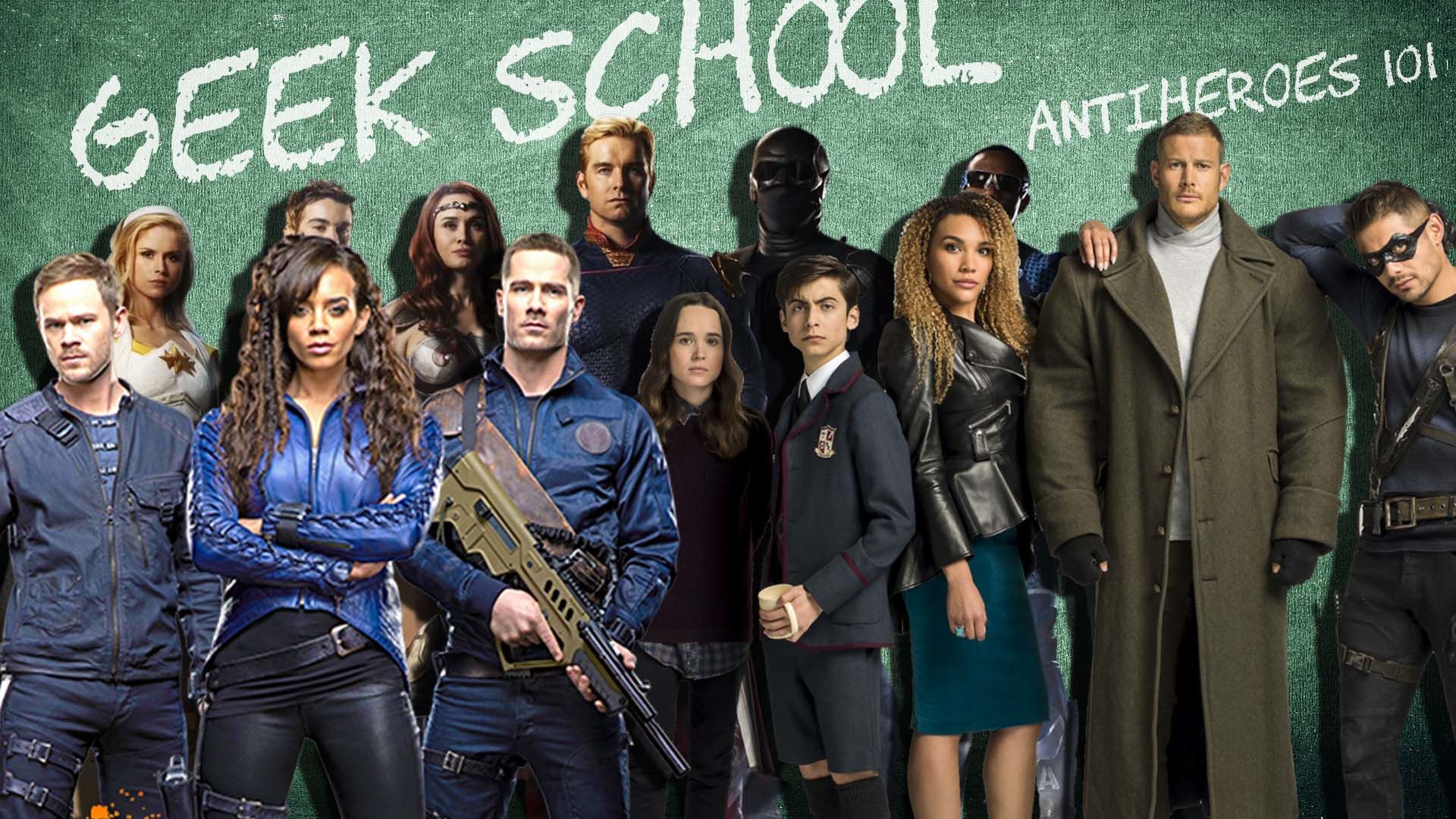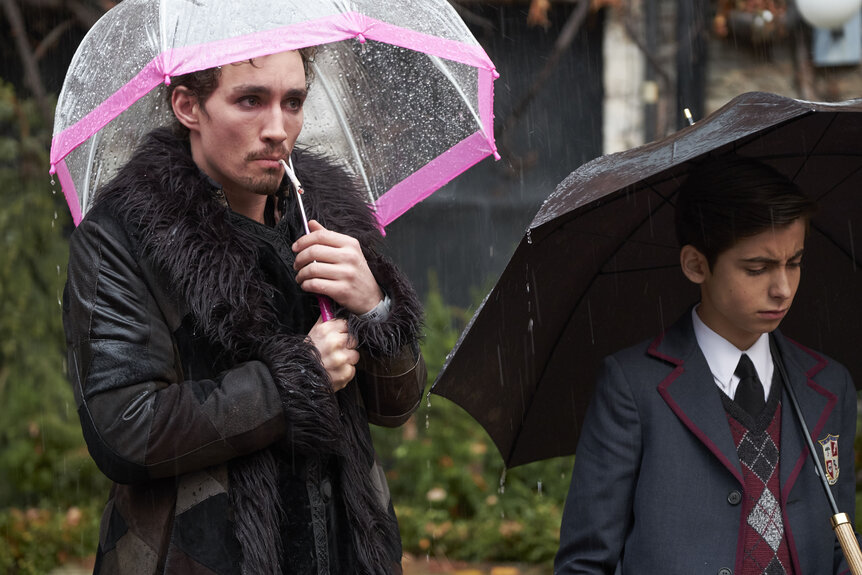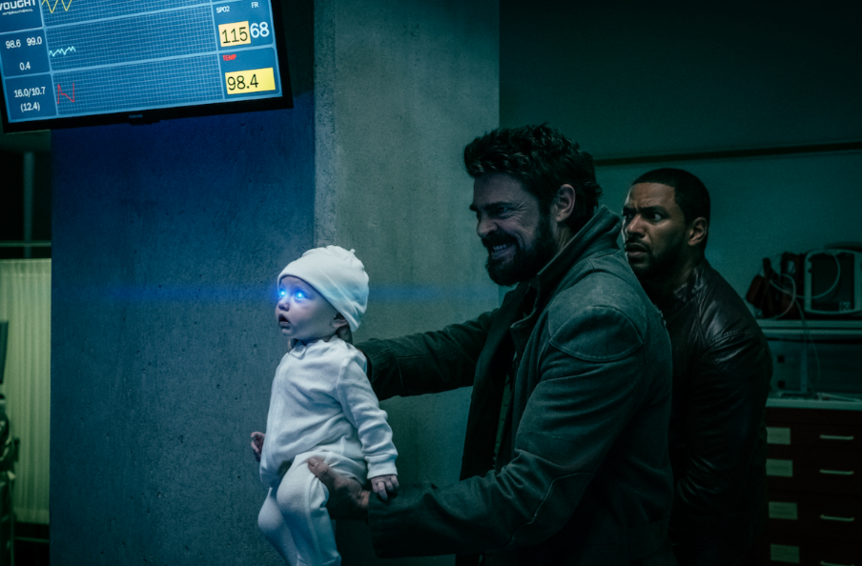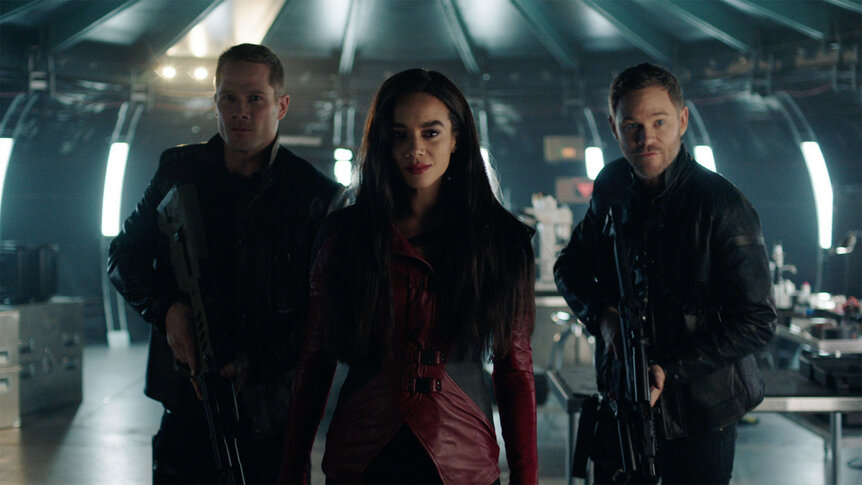Create a free profile to get unlimited access to exclusive videos, sweepstakes, and more!
How to create antiheroes, according to The Boys and Killjoys showrunners

Welcome to Geek School! This new SYFY WIRE series will provide practical lessons in writing, producing, and selling the nerdy projects of your dreams, with advice from some of the top creators and professionals in the business. In this lesson, we're talking about creating an antihero.
With apologies to Superman and an exemption for Captain America, audiences for the most part no longer crave square-jawed, strait-laced heroes. As box-office returns and cosplay contests make clear, the people, they crave bad boys and badass women, complicated characters with dark histories, vigilantes with soft sides, quick wits and equally quick tempers, who don't play by anybody else's rules.
Antiheroes are fully mainstream now, to the point that straight-up villains like the Joker are the focus of their own movies, to (relatively) little protest. Ironically, the shift in genre norms means that creating a good antihero is trickier than ever — they've got to be badasses, but not too badass, troublemakers who cause more trouble for the bad guys.
The Likability Factor
What leads audiences to like an antihero? Because that's what separates antiheroes from just plain villains — they're messed up, but we can't help but root for them. It's a complicated equation, but if there's one element you shouldn't worry about, it's likability — whatever that means.
Jeremy Slater, a screenwriter and producer on The Umbrella Academy, Fox's The Exorcist, and Fantastic Four, tells an apocryphal tale of a studio executive who fusses over a character in a script, demanding that the character be made more "likable" despite being absolutely incapable of expressing what that means. Finally, the exasperated screenwriter just changes the paragraph that introduces the character, writing, "Frank walks into the room. 36 years old, instantly likable."
And bam, with that one little addition, the exec is "over the moon" with the new direction — even if it didn't actually change anything or shape a character.
This is an issue that plagues the development of all protagonists, but is especially vexing for writers working on an antihero, given the balancing act that the character must perform.
"Here's what I've learned: When they say 'likable,' they often mean 'interesting,'" Slater tells SYFY WIRE. "It's the general sense that your hero is so bland or conventional that they're simply not jumping off the page, and the reader doesn't know how to convey that problem to you in a way that doesn't feel insulting. And the common response from most writers seems to be, well, let's throw in a Save The Cat moment in the first ten pages! Nobody liked Detective McHardass in my last draft, but look, now he's helping an old lady carry her groceries home on page three! Isn't that enough to make us love this guy? Well, no, not really."
So, what goes into crafting a Detective McHardass that audiences feel like watching, let alone get behind and care about?
The Best (Or At Least Interesting)
While likability shouldn't be your concern, you still should care about what audiences like. It's a fine line, but Slater describes it well.
"Audiences love characters who are good at what they do," he says. "The world's best archaeologist, the funniest girl in class, the Formula 1 driver who's never lost a race ... we like watching competency in action. We also like being surprised by a character! Give Detective McHardass a ridiculous hobby, or an unconventional marriage, or a crippling case of OCD, and I'm suddenly interested in him again."
Michelle Lovretta, the creator and EP of the SYFY original series Killjoys, offered similar advice.
"One thing that seems to be true across genres: competence buys a lot of forgiveness," she tells SYFY WIRE. "I find that fascinating. From Archer to House, if a character is extremely talented at what they do, the audience will let them get away with more, possibly because they've demonstrated 'value.' The same can be said for attractiveness and basic charm, and we have a ton of Charming Bastards on Killjoys."
Sympathy for the Devil
When they began working on the streaming TV adaptation of The Boys, showrunner Eric Kripke, producers Seth Rogen and Evan Goldberg, and their team faced a challenge familiar to many writers adapting the work of comic book icon Garth Ennis: The guy writes a lot of psychopathic characters, including his "good" guys. In this case, The Boys team had to reckon with Billy Butcher, a vigilante out for superhero blood.
"Butcher's a tricky character because the Butcher from the comics is a sociopath, he's f***ing scary," Kripke tells SYFY WIRE. "And from the beginning, Seth, Evan, and I discussed very seriously like, how sociopathic do we make him? And will America or the world follow a character that's just a straight-up psycho?"
Kripke cited the classic dark antiheroes of modern TV as guiding lights in their quest to make Butcher accessible. Walter White, Tony Soprano, Vic Mackey — they were monsters, but they were also clearly human, and figuring out how they worked was an important step.
"They might do terrible things, but they have real love and real motivations that the audience can get behind and root for, even if they're doing terrible things," Kripke says. "So we were like, we don't need to make Butcher likable, but we need to make him understandable, and ground him in as many relatable human emotions as we could, and let that motivate his terrible behavior."
Butcher, played by Karl Urban in the show, is on an obsessive, blood-thirsty quest for revenge against Vought, the evil superhero mega-corporation, and Homelander, Vought's most prized asset. Homelander is a straight-up villain — smarmy, murderous, and without a wisp of empathy, which creates an important distinction. Butcher's single-minded obsession with taking him down is fueled by his belief that Homelander raped his wife a decade prior, inflicting a trauma so bruising and total that it ultimately led to her disappearance.
With that driving his actions, it allowed Kripke and his team a lot of leeway in creating a character who lies as naturally and frequently as the rest of us breathe, continually puts his friends' lives at risk, kills with little remorse, and laughs in the face of decency.
"We needed to show how pained he is. We need to show that he really loves his guys. [The season] all built to this choice, this crossroads choice in Episode 8, where he has to decide between avenging his wife or saving these men, this family that he loves," Kripke explains. "Does he seek bloody revenge for a ghost, or does he support these living, breathing people all around him who he loves and who love him? And he makes the wrong choice. He takes the hateful path of vengeance, and that's why he's punished at the end of the season."
Audiences might be disappointed by that wrong choice, but only because they grew to care about Butcher. He had done some truly reprehensible, punishable-with-several-life-sentences things throughout the season, but it was hard to blame him — or, at the very least, hard not to see it from his point of view.
"Don't worry about whether your antihero's actions are too dark," Slater says, "worry about whether that darkness is justified, whether we can understand each choice that character made along the way, and whether we can see aspects of his struggle reflected in our own lives."
Redemption Journey
On Killjoys, Lovretta made a trio of antiheroes the central focus of the show's five-season journey (which, incidentally, concludes on September 20). Two of them, Dutch (Hannah John-Kamen) and D'Avin (Luke Macfarlane), began that journey "as arguably morally compromised characters," Lovretta says, which makes them far more compelling to watch. "We all want a little dirt on our halos," she observes, a snappy line that could have come out of one of her characters' mouths.
"Dutch was an assassin who had murdered many, and D'avin was a soldier with a dark past," she says. "It's clear that they're on a rocky redemption journey, so we could let them be pretty violent along the way and it didn't test the audience or the characters."
The characters know they were bad, and are at least trying to rectify their behavior, and that effort and intent helps — especially when they have no choice but to do some dirty work. Her protagonists aren't on a furious one-way trip to hell-or-high-water revenge, like Butcher in The Boys, but generating empathy from the audience is also a central tenet of their success as characters.
"When it comes to bad acts, I think the biggest factor for audience buy-in is character intent," Lovretta says. "Is it clear why the character did The Bad Thing, and is their reason for doing it something the audience can logically support, even if it's not something they'd ever personally want to do? If it doesn't feel earned, if it seems like something that the writers came up with just to manufacture tension or outrage, you'll just annoy people. Don't do that s***. It's cheap."
If you can avoid too many cheap moments, you can keep most people invested in tough characters for a long time. You might lose some people along the way — not everyone will have a strong enough stomach to handle a steady diet of hard-to-swallow gray matter — but your true fans will be all-in.
"By the time we reach our fifth and final season, all of our main characters have avoidable blood on their hands," Lovretta says. "I think the trick to keeping them likable is hidden in that great Schwarzennegger line from True Lies: 'Yeah, but they were all bad.' Heroes shoot bad guys, for good reasons. Bad guys shoot anyone, for s*** reasons. You can and should play at the edges of those rules, but it's pretty basic math."
More challenging is sliding a character in the opposite direction. In Killjoys, the assassin Johnny (Aaron Ashmore) is the "moral core" of the show — it's saying a lot out the gate when a man who hunts people down professionally and can legally kill is your show's moral core — and over time, he's forced to make difficult, deadly decisions as well. Building the character into someone who fans could forgive for their itchy trigger finger was an exercise in creating another kind of antihero.
"By the end of Season 2, Johnny shoots an unarmed woman in an alley, which is epically out of character. Now, there are a lot of ways where that scenario could be unforgivable, but no one in the audience seemed to bat an eye," Lovretta reflects. "That came down to three things: Johnny's a fan favorite who has earned their admiration; the woman he shot was the sort of competent character who feels dangerous even when unarmed; and, crucially, she herself had killed an unarmed woman, a beloved character named Pawter, and the audience wanted this vengeance. Johnny was doing what many of them secretly WANTED him to do, and that can be key in an antihero arc, and part of the basic allure.
"Antiheroes, at their best, are a vehicle for audience catharsis, a safe way for them to feel okay about occasionally wanting to do bad things without being bad people."
They Don't Have to Like It
Catharsis is a best-case scenario. Often, antiheroes are going to do things that make us wince. Often, it's not a matter of who antiheroes take out, but how they feel while doing it.
"If your 'hero' starts killing strictly for personal gain or pleasure, that slides 'em toward villain territory," Lovretta explains. "As it should."
It's not that it has to hurt them as much as it hurts the person they're punishing — by definition, it can't get worse than being killed — but an antihero has to know deep down that they're committing some serious sins, even if they're unavoidable acts in the service of a greater good. Even characters as depraved as Billy Butcher should be able to make the distinction.
"When you're writing and when you're directing, a good cheat code is to always play the opposite of the scene's intent. It doesn't work every time, but it's a good, quick cheat code to get to something complicated," Kripke offers. "I directed that [finale] episode, and I wasn't telling Karl, 'Be determined, this is your choice.' I said, 'This f***ing hurts, and you feel guilty about doing it, and you hate that you have to do it.'
"You have to do things, but you hate that you have to do them," Kripke continues, nailing one of the main tenets of antihero empathy. "You are reluctant to do things. Other things that you're happy about are things that you shouldn't be doing. What makes him so great is even when he's got Stillwell tied up, you can tell that he hates that he's doing it, and I think that goes a long way to make him sympathetic.
Butcher's pain makes him human, and when, at the end of that finale episode, he gets the shock of a lifetime, we forget about all of his sins and truly feel for the guy. Maybe we couldn't muster the guts to do what he did, but we can see how he got there, especially given the flagrantly disturbing context in which he's operating. Antiheroes often work best when the world is too screwed up for people to not take matters into their own hands.
"Walter White wasn't a great antihero because he wore a cool hat and growled a lot, we loved him because he felt authentic to his world, and he had a problem that any viewer could empathize with," Slater says, citing one of Kripke's own models for Butcher. "And although we were never entirely certain what he was going to do next, we could always understand his actions along the way. I'd argue that's all you ever need.
"Likability is for cowards. Write characters that you find interesting, and trust that audiences will feel the same way."





























